Posted by Elena del Valle on September 25, 2019
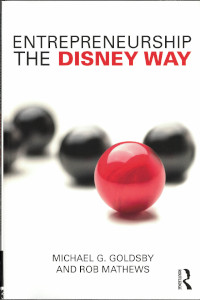
Entrepreneurship The Disney Way
Photos: Routledge, Zeller Photography, Ball State University
In Entrepreneurship the Disney Way (Routledge, $59.95) Michael Goldsby and Rob Mathews discuss their ideas about leadership and entrepreneurship modeled on the Disney company. They follow Disney’s rise from startup to media giant, highlighting how they believe the company’s leaders “carry on the legacy of Walt Disney’s mission and core values, enabling the company to continue growing and innovating.”
The 308-page softcover book published in 2019 is divided into seven chapters and two main parts: Walt Disney, Entrepreneur and Corporate Entrepreneurship at the Walt Disney Company.
“The book was written for a wide audience, but the two parts of the book target A) entrepreneurs and leaders, and B) owners, leaders, and managers of/ in mid-sized to large companies and other organizations,” Mathews said by email in response to a question about the primary target audience for the book.
When asked how long the project took from idea to publication he replied, “Mike and I developed a love for Disney Parks and Resorts in the last 15 years. We spent the last 10-12 years researching the company and specifically its parks and resorts. We started started talking about and planning a book about 10 years ago. The actual writing and editing process took about a year.”
Each chapter includes end notes and highlights Lessons, 30 in total. The first part of the book is dedicated to Walt Disney and his vision. The second part focuses on the transition from a family business to the company it is today.
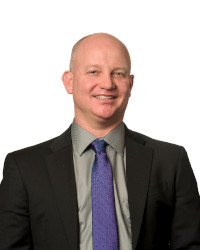
Rob Mathews, co-author, Entrepreneurship The Disney Way
“Most jobs, businesses, and projects go well when they match your passion and psychological talents. Writing is no different,” Mathews said when asked why he and his co-author selected Disney as the model company for the book. “Mike and I had great knowledge of Disney as a business model, we had friends in the company, we love the company as a consumer, and we connected with the story of Walt’s vision, perseverance, and legacy that lives on today. I would also add that the way we approach our lives and business matches up with Disney very well. We value innovation, heritage, professionalism, intentionality, attention to detail, and great leadership. Disney is an exemplary model for those principles.”
In what ways does a mission developed in the 1920s remain relevant today? “Disney’s mission is timeless,” Mathews said. “It essentially hasn’t changed since Walt’s initial vision. The company’s overall mission–essentially to be the best in entertainment–and the parks and resorts mission–basically to create happiness–have more or less remained the same. Those missions are simple, inspiring, and easy to get behind as a leader, cast member, partner, or vendor. And the customer can feel and experience the Disney difference, as we like to call it.”
When asked to share examples of Disney entrepreneurship and innovation in the past three years he said, “Most of Disney’s recent innovations that come to mind have surfaced in the theme parks. Attractions like Tron Lightcycle Power Run in Shanghai Disneyland, Avatar Flight of Passage in Animal Kingdom, Slinky Dog Dash in Hollywood Studios, and Millennium Falcon: Smuggler’s Run are truly cutting edge. The parks and lands that house those attractions, Shaghai Disneyland, Toy Story Land, Star Wars: Galaxy’s Edge, Pandora – The World of Avatar, are breathtaking innovations that remove guests from the realities of their lives. Pandora literally looks like we saw it on the movie, and the Star Wars land makes you forget that you are in a theme park. Beyond attractions and theming, less noticeable, yet highly impactful system and process innovations, such as waste management at Magic Kingdom, the most visited theme park in the world, have changed the way Disney does business.”
When asked: The Millennial generation is said to be the most diverse generation yet. In what way does the model you propose take into account Millennials, diversity among workers and customers? he replied, “Our Entrepreneurial Leadership Instrument (ELI), like most assessment tools in my belief, bridge generational gaps and provide a common language for people. These tools demonstrate the value of each person, and empower people to be themselves. For a generation that was told to behave a certain way, think very specifically, and take orders, genuine and authentic use of such tools is extremely refreshing and encouraging. Millennials appreciate that kind of approach to leadership and team building. Good assessment tools also highlight the value and critical importance of cognitive diversity, along with building diverse teams. As for customers, the ELI points to the need to speak differently to different players. Not everyone will respond to marketing, mission, branding, brand promise, etc. the same, and companies need to know that and build appropriate strategies. The days of push marketing are largely over. It’s a lot like how good teachers make sure they are addressing the various learning styles in the classroom.
The Disney Company has done an excellent job of creating a very diverse culture that welcomes and provides opportunities for all people. Millennials like working at Disney because the mission is clear, positive, and constantly supported and reinforced. Millennials are very mission-centered, so Disney’s extreme emphasis on mission and investment in people in very attractive to them.”
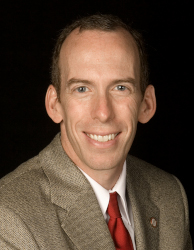
Michael Goldsby, co-author, Entrepreneurship The Disney Way
When asked about allegations of gender parity issues at Disney (see Underpaid and undervalued: 10 women claim systemic discrimination at Disney from September 18, 2019, The Guardian, theguardian.com/world/2019/sep/18/disney-lawsuit-gender-pay-gap-abc?), Mathews replied: “I can’t really speak to the media side of the company too much, as we don’t have contacts there, nor has it been our research focus. The Parks and Resorts division seems to treat all cast members extremely well, so it does not impact the concepts we shared in the book.”
Only Mathews responded to email questions. Goldsby is chief entrepreneurship officer and Stoops Distinguished professor of Entrepreneurship at Ball State University in Indiana. Mathews is the director of the Institute for Entrepreneurship and Free Enterprise at Ball State University.
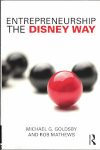
Click to buy Entrepreneurship the Disney Way
Comments:
Filed Under: Books
Posted by Elena del Valle on September 9, 2019

Katherine Eban, author, Bottle of Lies
Photo: Roberto Falck
A podcast interview with Katherine Eban, author, Bottle of Lies (see Investigative journalist reveals troubling side of generic drugs) is available in the Podcast Section of Hispanic Marketing and Public Relations, HispanicMPR.com. During the podcast, she discusses her book with Elena del Valle, host of the HispanicMPR.com podcast.
Katherine Eban is a Fortune magazine contributor, and has also written for Vanity Fair, Self, and The Nation. She is the author of Dangerous Doses: A True Story of Cops, Counterfeiters and the Contamination of America’s Drug Supply. She formerly worked as a staff writer for The New York Times and the New York Observer. Educated at Brown University and Oxford, where she was a Rhodes Scholar, she lives in Brooklyn with her husband and two daughters.
To listen to the interview, scroll down until you see “Podcast” on the right hand side, then select “HMPR Katherine Eban” and click on the play button below or download the MP3 file to your iPod or MP3 player to listen on the go, in your car or at home from the RSS feed. Some software will not allow flash, which may be necessary for the play button and podcast player. If that is your case, you will need to download the file to play it. To download it, click on the arrow of the recording you wish to copy and save it to disk. The podcast will remain listed in the September 2019 section of the podcast archive.
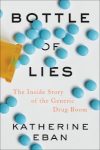
Click to buy Bottle of Lies
Posted by Elena del Valle on August 26, 2019
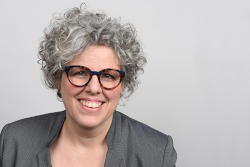
Rana Adib, executive secretary, Ren21
Photo: Ren21
A podcast interview with Rana Adib, executive secretary, Ren21 is available in the Podcast Section of Hispanic Marketing and Public Relations, HispanicMPR.com. During the podcast, she discusses sustainable energy with Elena del Valle, host of the HispanicMPR.com podcast.
Previously, Rana was Ren21’s research coordinator developing the international expert community and leading the Ren21 Renewables Global Status Report series to become an international reference. Prior to Ren21 Rana worked in private industry and applied research in the areas of renewable energy, energy access, and waste management. She has over 20 years of experience in the energy sector.
To listen to the interview, scroll down until you see “Podcast” on the right hand side, then select “HMPR Rana Adib” and click on the play button below or download the MP3 file to your iPod or MP3 player to listen on the go, in your car or at home from the RSS feed. Some software will not allow flash, which may be necessary for the play button and podcast player. If that is your case, you will need to download the file to play it. To download it, click on the arrow of the recording you wish to copy and save it to disk. The podcast will remain listed in the August 2019 section of the podcast archive.
Posted by Elena del Valle on August 19, 2019
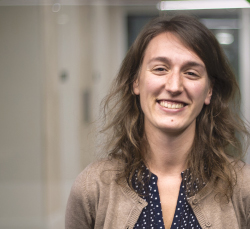
Tiffany Finck-Haynes, program manager, Friends of the Earth
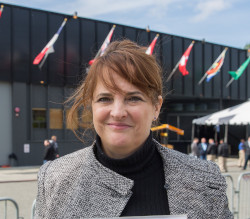
Lisa Lindsley, capital markets advisor, SumOfUs
Photos: SumOfUs, Friends of the Earth
A podcast interview with Tiffany Finck-Haynes, program manager, Friends of the Earth, and Lisa Lindsley, capital markets advisor, SumOfUs, is available in the Podcast Section of Hispanic Marketing and Public Relations, HispanicMPR.com. During the podcast, they discusse bee health and pollinators with Elena del Valle, host of the HispanicMPR.com podcast.
Tiffany leads the organization’s work to eliminate toxic pesticides and advance a sustainable and just food system to protect people, pollinators and the planet. She leads federal, state, local policy and marketplace campaigns aimed at reforming industrial agriculture. Prior to joining Friends of the Earth, she worked as a community health organizer at Many Languages One Voice, running campaigns to improve equitable access to affordable, culturally and linguistically appropriate health-related information, services, and care for nail salon workers and day laborers.
After getting her start on Wall Street, Lisa’s 33-year career in finance has taken her from the microfinance industry to the United States labor movement. She has lived in Brazil, Argentina and Mexico and is fluent in Spanish and Portuguese. Prior to joining SumOfUs, Lisa was director, Capital Strategies American Federation of State County and Municipal Employees (AFSCME). She led the effort to remove Jamie Dimon as the board chair of JPMorgan Chase, helped pass the Dodd-Frank Act, and pioneered shareholder initiatives around American Legislative Exchange Council (ALEC) and human rights. Lisa left her position as a managing director, Latin American Corporate Finance Division, Bear Stearns in 1995 to enter the microfinance field.
To listen to the interview, scroll down until you see “Podcast” on the right hand side, then select “HMPR Tiffany Finck-Haynes, Lisa Lindsley” and click on the play button below or download the MP3 file to your iPod or MP3 player to listen on the go, in your car or at home from the RSS feed. Some software will not allow flash, which may be necessary for the play button and podcast player. If that is your case, you will need to download the file to play it. To download it, click on the arrow of the recording you wish to copy and save it to disk. The podcast will remain listed in the August 2019 section of the podcast archive.
Posted by Elena del Valle on August 12, 2019
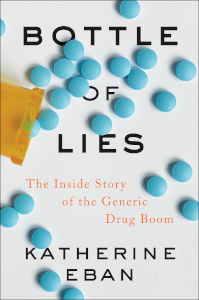
Bottle of Lies
Photos: Ecco, Roberto Falck
Investigative journalist Katherine Eban dedicated 10 years of her life to researching and writing about the generic drug industry boom in the United States. Along the way she read official documents, spoke with whistleblowers, lawyers and government employees, uncovering disturbing truths about the quality and trustworthiness of the drugs that many would prefer remain in the dark. This year her findings became available to the public in Bottle of Lies The Inside Story of the Generic Drug Boom (Ecco, $28.99). There is also an audio edition narrated by Eban. A paperback edition is due May 2020.
The 482-page non fiction book is easy to read and engaging, more like a novel than a non-fiction expose. It outlines the events that led to the blossoming of a huge generic drug industry in the United States and the myriad problems she uncovered. It is divided into 28 chapters and seven main parts: Shifting Ground, India Rises, A Cat-and-Mouse Business, Making A Case, Detectives in the Dark, The Watershed, and Reckonings.
“The book is entirely non-fiction, Eban said by email. “Every detail in the book is supported by documentation, interviews, or source recollections, and no names have been changed.”
When asked about her personal motivator, she replied, “My reporting on the generic drug industry actually began a decade ago, when I was contacted by the host of an NPR radio show, The People’s Pharmacy. The host, Joe Graedon, said that patients were contacting him with complaints about side effects from their generic drugs. He suggested I look into the question of what is wrong with the drugs. It quickly became apparent to me that just documenting patient concerns would not get me very far in answering that question. I realized the answers most likely lay in the manufacturing plants and boardrooms of the companies making our drugs – which meant in India and China.
My effort to answer that original question — What is wrong with the drugs? — turned into a global mystery that kept me reporting and digging.”

Katherine Eban, author, Bottle of Lies
The primary target audience for the book? “Anyone and everyone, the author said. “The story is real-life global thriller with big money and life-and-death consequences at its core. Anyone who enjoys a page-turning detective story, who wants to learn about the dark side of globalization, or who takes any medicine at all, is the ideal reader.”
About the book project overall the author said, “The biggest challenge was: how was I, as an independent U.S.-based journalist — without a newsroom, a team of colleagues, or other resources at my disposal — going to be able to penetrate an industry, and companies, that were based on another continent? The difficulties of a global investigative project were unrelenting.
The most rewarding was finally being able to get real insight into those distant manufacturing plants, and to convey that to readers. The reaction has been immense. I am flooded with emails from grateful readers, almost all of whom are consumers of generic drugs. They feel enlightened by the book.”
Eban said that since the book came out, she has been contacted by Congressional committees, interested in investigating the problems she raised. One measure of success, the author said, would be to help fix the problems her book exposes.

Click to buy Bottle of Lies
Posted by Elena del Valle on June 24, 2019
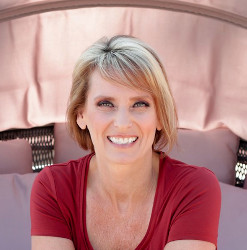
Jennifer Marcenelle, CEO, Burn Bright Today
Photo: Jennifer Marcenelle
A podcast interview with holistic nurse Jennifer Marcenelle, CEO, Burn Bright Today is available in the Podcast Section of Hispanic Marketing and Public Relations, HispanicMPR.com. During the podcast, she discusses gemstone therapy to combat burnout with Elena del Valle, host of the HispanicMPR.com podcast.
She the founder Burn Bright Today. Jennifer, a Board-Certified holistic nurse with over 30 years of experience in the medical industry, also has the following M.B.A., B.S.N., R.N., H.B.C.-H.N. credentials to her name. She is a certified Gemstone and Diamond Therapy Associate Practitioner. When she was 44, she had a health crisis and near suicide from burnout. Following those experiences she has dedicated her career to helping people move from Burning Out to Burning Bright.
To listen to the interview, scroll down until you see “Podcast” on the right hand side, then select “HMPR Jennifer Marcenelle” and click on the play button below or download the MP3 file to your iPod or MP3 player to listen on the go, in your car or at home from the RSS feed. Some software will not allow flash, which may be necessary for the play button and podcast player. If that is your case, you will need to download the file to play it. To download it, click on the arrow of the recording you wish to copy and save it to disk. The podcast will remain listed in the June 2019 section of the podcast archive.
Posted by Elena del Valle on June 17, 2019
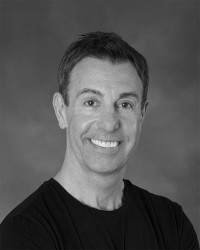
Louis Bezich, author, Crack the Code
Photo: Louis Bezich
A podcast interview with Louis Bezich, author, Crack the Code (see Health Care executive examines healthy behaviors in men over 50) is available in the Podcast Section of Hispanic Marketing and Public Relations, HispanicMPR.com. During the podcast, he discusses a new approach to men’s health with Elena del Valle, host of the HispanicMPR.com podcast.
Louis is senior vice president at Cooper University Health Care. A men’s health advocate, he uses his devotion to health and fitness to motivate men over 50 to establish their own healthy lifestyles.
With more than 40 years of executive experience, the author also serves as an adjunct professor in the Graduate Department of Public Policy Administration at Rutgers University. He has published numerous articles in the field of public administration and health and is a contributing author to Corporate Lawbreaking and Interactive Compliance.
To listen to the interview, scroll down until you see “Podcast” on the right hand side, then select “HMPR Louis Bezich” and click on the play button below or download the MP3 file to your iPod or MP3 player to listen on the go, in your car or at home from the RSS feed. Some software will not allow flash, which may be necessary for the play button and podcast player. If that is your case, you will need to download the file to play it. To download it, click on the arrow of the recording you wish to copy and save it to disk. The podcast will remain listed in the June 2019 section of the podcast archive.
Posted by Elena del Valle on June 10, 2019
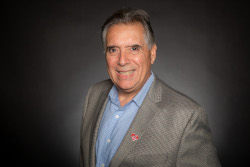
Javier O. Delgado, CEO, PeopleToo LLC
Photo: Javier O. Delgado
A podcast interview with Javier Delgado, founder, PeopleToo LLC is available in the Podcast Section of Hispanic Marketing and Public Relations, HispanicMPR.com. During the podcast, he discusses the global employee engagement crisis with Elena del Valle, host of the HispanicMPR.com podcast.
Javier is the chief executive officer of PeopleToo LLC, a human resources and management consulting firm. He is a certified business and executive coach, trainer and speaker. He is considered one to the top 100 Coaches Worldwide according to Glocoach.com in Shanghai, China. He has over 35 years of experience in senior human resources management positions in the Fortune 500.
To listen to the interview, scroll down until you see “Podcast” on the right hand side, then select “HMPR Javier Delgado” and click on the play button below or download the MP3 file to your iPod or MP3 player to listen on the go, in your car or at home from the RSS feed. Some software will not allow flash, which may be necessary for the play button and podcast player. If that is your case, you will need to download the file to play it. To download it, click on the arrow of the recording you wish to copy and save it to disk. The podcast will remain listed in the June 2019 section of the podcast archive.
Posted by Elena del Valle on June 6, 2019
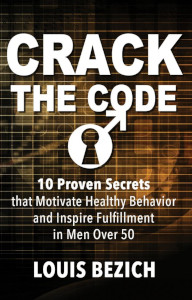
Crack the Code
Photo: Somos
Louis Bezich, senior vice president of Strategic Alliances at Cooper University Health Care, is a passionate men’s health advocate. So much so that he dedicated four years to writing Crack the Code 10 Proven Secrets That Motivate Healthy Behavior and Inspire Fulfillment in Men Over 50 (Somos, $19.99), his first book. The 284-page softcover book, 100 percent self-financed, was published this year.
He hopes to motivate men over 50 to establish their own healthy lifestyles. He is already working on a follow up title on a topic he declined to disclose.
“The project involved concept development, initial focus groups, the national survey, interviews, probably a year or so of writing and editing, then post-writing development of the title, cover and other publication tasks,” he said by email when asked how long it took him to publish the book.
When asked why he wrote the book in 2019 he said, the combination of three factors inspired him to write the book: his personal experience, his belief that existing approaches to foster healthy behavior have failed, and his belief that the value-proposition is too strong to ignore.
“I discovered the power of motivation during my time as a single dad,” he said. “Exercise was my means of coping with the stress of raising two sons, pursuing a career and ensuring that I was fit so I would always be there for the boys. I witnessed first-hand the connection between happiness and healthiness. For me, what started as a coping mechanism as a twenty-something dad became a passion as a fifty-something man when the boys were off on their own.
When I became a health care executive, I was alarmed to learn that that only 3 percent of Americans lead a healthy lifestyle and 40 percent are considered obese. Even more concerning is that men over 50, my demographic, are the poster child for poor health practices; we refuse to see a doctor and have what experts call a health attention gap. All this in the context where our own behavior is by-far, the most significant influence on our health and we spend more on health that any other industrialized nation in the world. This represents a failure of our current systems and cry for a new unconventional approach.
Healthy behavior powered by social motivators is a win-win, personally, culturally and economically. As individuals we can improve our health and increase our happiness. As a society we have the ability to make a change with huge significance. And, from a health-care perspective, we can impact the need and ultimately the cost of care. (i.e., examples—seat belt use, smoking cessation, recycling). The case for healthy behavior is just too strong to ignore.”

Louis Bezich, author, Crack the Code
When asked who is the primary target audience for the book he explained he expects it will appeal most to men over 50 and the people that love them; their wives, partners, children and grandchildren. Additional audiences could include health care providers, insurers, policy makers and “anyone who has struggled with their health.”
The “10 Proven Secrets” mentioned in the book’s subtitle refer to his research on healthy behaving men 50 and over that included a survey of 1,000 men nationwide and 30 interviews. He believes his findings are consistent with the literature on behavioral health.
When asked to share advice with readers who struggle adopting healthy behaviors such as adjusting to changes, making new friendships and relationships he replied, “Before your purchase that gym membership, order the exercise equipment or start that new diet, build your personal motivational platform based around your social relationships following these three basic steps: Conduct Your Social Inventory. Think about what’s most important in your life. Really consider, I mean really think about what’s ahead in the years to come, and what you’d like to be doing this week, this month or this year with your wife, partner, children, grandchildren, your job, your volunteer work whatever. Think about the rest of your life; what’s ahead for you, and perhaps more importantly, what the future holds for the ones your love. Think about the joy of active participation, versus restricted or perhaps even no participation in their lives. When you’ve completed your inventory, think about how your aspirations match your current lifestyle and recognize the gaps.
Build Your Social Platform. Second, based on your inventory, and those gaps you’ve identified, build your personal social platform. The healthy men have clear social goals and robust calendars and activities that give them purpose and meaning, and most importantly, the motivation to stay healthy. Do the same and engage your loved ones in the process. It can actually be fun.
Third, work your strategy. Find your rhythm. The healthy men use routines, rituals and habits as guardrails of their behavior and are in a position to bounce back quickly if they are drawn off course. Rhythm feels good and provides a level discipline.”
With more than 40 years of executive experience, Bezich also serves as an adjunct professor in the Graduate Department of Public Policy Administration at Rutgers University. Bezich has published numerous articles in the field of public administration and health and is a contributing author to Corporate Lawbreaking and Interactive Compliance.

Click to buy Crack The Code
Comments:
Filed Under: Books
Posted by Elena del Valle on May 20, 2019
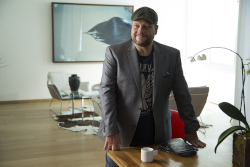
Francisco Serrano, CEO, 121
Photo: Jesus Lara
A podcast interview with Francisco Serrano, CEO, 121 is available in the Podcast Section of Hispanic Marketing and Public Relations, HispanicMPR.com. During the podcast, he discusses why an agile leader is key to success with Elena del Valle, host of the HispanicMPR.com podcast.
Francisco, who is also president and chief speed officer of 121, is a branding specialist with over twenty years of experience in mid-to-large-sized national and international organizations. He has worked primarily in corporate and product development, brand strategy and brand architecture, packaging as well as in video and web development.
Prior to starting 121, Francisco worked as the director of Client Services at Alazraki, a leading advertising agency in Mexico. He also served in leadership roles at C&A, a European retail store conglomerate, where he headed communications management and new product development. Francisco has been a key player in international brand implementations for McCormick, Bayer, Heineken, Cadbury, OxiClean, Ferrero Rocher, and Hershey’s. He has worked in the launch strategy campaigns for RB’s Lysol and Air Wick.
To listen to the interview, scroll down until you see “Podcast” on the right hand side, then select “HMPR Francisco Serrano” and click on the play button below or download the MP3 file to your iPod or MP3 player to listen on the go, in your car or at home from the RSS feed. Some software will not allow flash, which may be necessary for the play button and podcast player. If that is your case, you will need to download the file to play it. To download it, click on the arrow of the recording you wish to copy and save it to disk. The podcast will remain listed in the May 2019 section of the podcast archive.

























